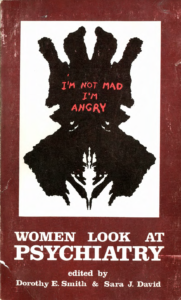Women Look at Psychiatry: I’m Not Mad I’m Angry.
Dorothy Smith and Sara David, Editors
Vancouver: Press Gang Publishers, 1975
 I’m Not Mad I’m Angry, the popular name for this historic publication, is an early feminist critique of the practice of psychiatry and how it contributed to the oppression of women. The first title put out by the newly formed feminist Press Gang Publishers of Vancouver, the book grew out of a 1973 University of British Columbia lecture series “Madness in Society” where Dorothy Smith (a sociologist) and Meredith Kimball (a psychologist) presented a strong political analysis of the negative encounters women had with psychiatry. Published two years later, the volume made clear the extent to which women were demeaned, manipulated, and disregarded in their encounters with psychiatry, and demonstrated the beginnings of a small feminist awakening in the field.
I’m Not Mad I’m Angry, the popular name for this historic publication, is an early feminist critique of the practice of psychiatry and how it contributed to the oppression of women. The first title put out by the newly formed feminist Press Gang Publishers of Vancouver, the book grew out of a 1973 University of British Columbia lecture series “Madness in Society” where Dorothy Smith (a sociologist) and Meredith Kimball (a psychologist) presented a strong political analysis of the negative encounters women had with psychiatry. Published two years later, the volume made clear the extent to which women were demeaned, manipulated, and disregarded in their encounters with psychiatry, and demonstrated the beginnings of a small feminist awakening in the field.
The co-editors of the collection are an interesting pair. An eminent social and political theorist, Dorothy Smith is most often associated with the Ontario Institute for Studies in Education (OISE), but in the mid-1970s she was busy parenting, teaching ,and founding a Women’s Studies Program at the University of British Columbia. A practicing clinical psychologist in Vancouver from 1972, Sara Joy David had been educated at the University of California and Duke University, and was also an early Women’s Studies educator, serving on the committee that established Simon Fraser University’s program.
Contributors to the collection include former psychiatric patients, feminist therapists, and mental health activists from the radical Vancouver Mental Patients Association (MPA).
Less scholarly than Phyllis Chesler’s seminal Women & Madness, published in 1973, I’m Not Mad I’m Angry is part memoir, part analysis, part how-to-rebel handbook. Like Women & Madness, this slim volume demonstrates that a radical critique of psychiatry was an important item in the early feminist playbook, and thus begs the question: why did the women’s movement abandon mad liberation? Nonetheless, its focus on storytelling, fighting psychiatric oppression ,and finding solidarity locates I’m Not Mad I’m Angry squarely in the Canadian canon of mad-centered publications, following on Mary Huetis Pengilly’s Diary Written in the Provincial Lunatic Asylum and anticipating Shrink Resistant.
